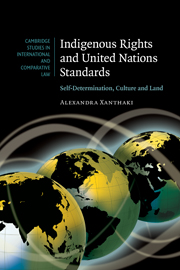Book contents
- Frontmatter
- Contents
- Table of cases
- Table of statutes
- Acknowledgments
- Introduction
- 1 Recognition of cultural membership and implications
- Part I United Nations instruments on indigenous peoples
- Part II Thematic analysis
- 4 Do indigenous peoples have the right to self-determination?
- 5 Indigenous cultural rights
- 6 Indigenous land rights
- Conclusions
- Bibliography
- Index
- CAMBRIDGE STUDIES IN INTERNATIONAL AND COMPARATIVE LAW
4 - Do indigenous peoples have the right to self-determination?
Published online by Cambridge University Press: 25 July 2009
- Frontmatter
- Contents
- Table of cases
- Table of statutes
- Acknowledgments
- Introduction
- 1 Recognition of cultural membership and implications
- Part I United Nations instruments on indigenous peoples
- Part II Thematic analysis
- 4 Do indigenous peoples have the right to self-determination?
- 5 Indigenous cultural rights
- 6 Indigenous land rights
- Conclusions
- Bibliography
- Index
- CAMBRIDGE STUDIES IN INTERNATIONAL AND COMPARATIVE LAW
Summary
Introduction
Indigenous representatives have repeatedly stressed that they view the recognition of their right to self-determination as essential for their survival and development and ‘the key to the implementation of solutions for their problems’. Article 3 of the draft Declaration which currently recognises a right of self-determination has been referred to as ‘the heart of the Declaration’, its ‘cornerstone’, the pillar upon which all other provisions of the draft Declaration rest and the ‘prerequisite for the full enjoyment of all human rights’ of indigenous peoples. It is unfortunate that such a central claim to the indigenous movement is such a contested right in international law.
Self-determination is a thorny topic in international law with remarkable contradictions. While it has been liberally used as a slogan of universal application, its application always seems to be set with difficulties of considerable complexity. Falk notes that the successful creation of new states as a result of struggles for self-determination has ‘both strained conceptual boundaries and created an increasingly awkward gap between doctrinal and experiential accounts of self-determination, resulting, as might be expected, in controversy and confusion’. Indeed, currently there are no standard answers as to the modalities of the right. Although this creates confusion, it also encapsulates the richness and diversity of the ways self-determination can operate. It is this fluidity of the right that has allowed the development of some ‘dialogic spaces’ in which a discourse on indigenous claims can take place.
- Type
- Chapter
- Information
- Indigenous Rights and United Nations StandardsSelf-Determination, Culture and Land, pp. 131 - 195Publisher: Cambridge University PressPrint publication year: 2007



